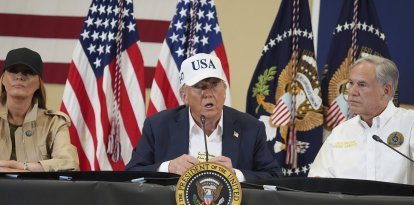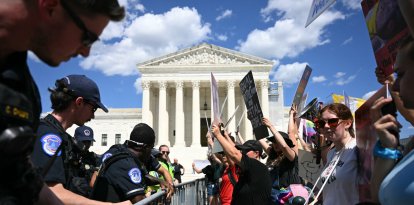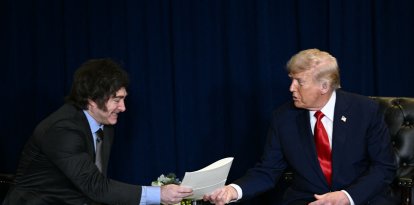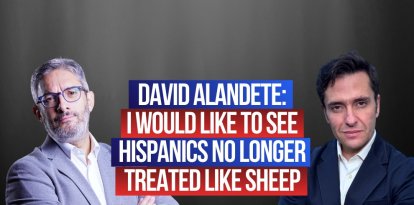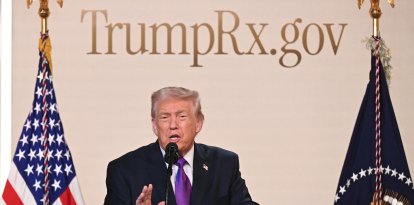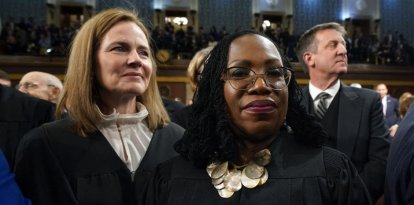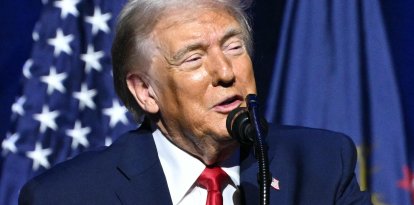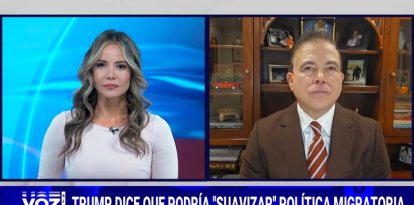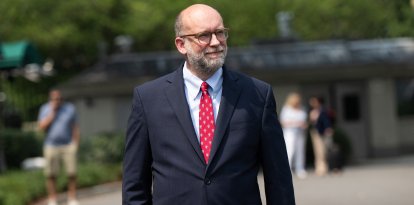Trump trial in New York: After Judge Merchan's controversial instructions, the jury completes its first day of deliberations
The former president, after leaving the courthouse in Manhattan, claimed that “Mother Teresa could not beat these charges.” Legal experts and Republican allies criticized the process.

El expresidente Trump denunció las ""instrucciones del juez"" como ""las más injustas de la historia"". (AFP)
Donald Trump's criminal trial into a “hush money” payment in New York, the first against a former president in the history of the United States, has reached the deliberation stage. The jury of 12 New Yorkers—composed of seven men and five women— will begin deliberations after receiving instructions from Judge Juan Merchan.
These twelve jurors will decide the immediate legal and political future of Trump. If found guilty, he could face a sentence ranging from probation to four years in prison.
Jury deliberations are usually unpredictable, especially in complex cases. It's common to wait days or weeks for a verdict. Judge Merchan has stated that the jury could deliberate until 4:30 p.m. ET this Wednesday, but there is no set timeline for how long the deliberations will take.
What are the judge's instructions? Why are they so important and why are they being questioned?
Merchan, who Trump has harshly questioned in recent weeks, today gave the jury instructions. This step involves the judge explaining to the jury how to apply the law to the case.
Trump faces 34 felony counts of falsifying business records in connection with an alleged $130,000 payment made to a porn star, Stormy Daniels, during the 2016 election campaign.
The State argues that this payment was intended to buy Daniels' silence about an alleged affair she had with the former president.
According to the Prosecutor's Office, Trump's former intermediary, Michael D. Cohen, nicknamed by the State as "the fixer," made the payment, which was then reimbursed by Trump. The accusation claims Trump concealed the nature of the reimbursement.
Since falsifying business records is typically a misdemeanor, the jury must find that Trump committed this act while attempting to conceal a second crime for him to be found guilty of serious offenses. Judge Merchan explained this requirement to the jury based on the evidence presented.
Since falsifying business records is a misdemeanor, for Trump to be found guilty of a felony, the judge explained to the jury that they must find, based on the evidence, that the former president committed the first crime (falsifying business records) while attempting to conceal a second. crime.
"That alleged second crime, he told the panel, is a state election-law offense that makes it illegal to conspire to promote the election of a candidate by unlawful mean," reads a Wall Street Journal explanation. "Jurors may disagree on what those unlawful means are, the judge said, but still find Trump guilty. He offered them several options: a tax-law violation, a federal campaign-finance law offense and a state falsifying records misdemeanor".
This explanation has sparked controversy and criticism against Merchan.
His instructions, a crucial step in resolving the case, have drawn significant attention following the closing arguments from both the defense and the prosecution on Tuesday. Now, many analysts and legal experts from conservative media are claiming that Merchan lowered the threshold of the criminal charge to secure a guilty verdict.
According to renowned professor and legal expert Jonathan Turley, Merchán admitted the possibility that Trump may have violated electoral law according to a dubious legal theory of the Prosecutor's Office.
During closing arguments, Prosecutor Joshua Steinglass said that Trump's payment to Daniels through Cohen meant a “subversion” to democracy and constituted massive fraud on voters because the porn actress's story was “buried” when it was about to be released to the media.
However, Turley and other legal experts clarified that a private agreement to silence a story does not constitute an electoral crime. Moreover, previous investigations into this potential violation of federal electoral law found no evidence of Trump's wrongdoing. Nevertheless, Merchan issued an instruction that could complicate the defense's case.
"Judge Merchan is giving the standard instruction that they can reach inferences based on facts such as inferring that it rained from seeing people in raincoats. It is a rather quaint instruction after Merchan allowed the prosecutors to state as a 'fact' that federal election violations occurred in this case. There is no such violation in this case, but Merchan did nothing to correct the erroneous impression,” said expert Turley.
This was not the only instruction from the judge questioned by Turley or other legal experts.
Former prosecutor, former representative and now television host Trey Godwy, who was present in court, severely criticized Judge Merchan for not sending a copy of the instructions to the jury room.
“We are about to witness the dualism of something being simultaneously very important and very dry. Many lawyers - including this one - had a hard time following jury instructions in court. One has to wonder how laypersons can do so,” Godwy said, explaining that the jury could be lost due to the large number of potential crimes to be deliberated.
However, perhaps the most controversial instruction was how to reach a unanimous verdict.
According to Merchan, since the jury must determine whether Trump is guilty of the first crime (falsification of records) to cover up another crime (there are three available), the entire jury doesn't need to agree on which second crime was violated to arrive to a unanimous verdict. This provoked harsh criticism, especially from Turley, who called this instruction the “coup de grace” for the defense.
"Merchan just delivered the coup de grace instruction," Turley explained. "He said that there is no need to agree on what occurred. They can disagree on what the crime was among the three choices. Thus, this means that they could split 4-4-4 and he will still treat them as unanimous.”
On this point, Godwy also pointed out that, with this instruction, the verdict for Trump can be more complex to achieve an acquittal: “It seems this is an all-or-nothing case, assuming arguendo there is a verdict and not a hung jury.”
This instruction is important because, according to the prosecutor's office, in addition to a potential electoral crime, in this case there is knowledge of a potential conspiracy and a possible tax violation.
According to legal experts, Merchan accommodated these legal theories and gave the jury instructions on how to determine whether or not Trump was guilty of conspiracy.
Fox News reporter Lydia Hu was inside the courtroom and explained what exactly Merchan told the jury about the conspiracy crime.
“He said, mere knowledge of a conspiracy does not make [the] defendant a co-conspirator. Prosecutors must prove intent," Hu said. “Also, being present with others when they form a conspiracy does not mean that the defendant is a part of the conspiracy.”
At this point, the judge also spoke about Cohen's testimony and emphasized that the testimony of Trump's former lawyer should not be considered sufficient evidence to find the defendant guilty.
However, that does not undermine the significance of Cohen's testimony in the deliberations. In fact, it is quite important. For instance, the jury could potentially discern Trump's intent to conspire based partly on the former lawyer's testimony and the evidence presented by the prosecutor's office.
Legal experts, particularly those critical of the process, agreed that potential tax violations pose a significant challenge for Trump in this case. This is exacerbated by the legal theory permitted by Judge Merchan.
“Seems a real vulnerability for Trump is the tax crime. We’ve not talked about it a lot and there was not a lot of focus during trial on the tax charges. But, as Merchan just instructed, a tax crime could have been committed even if there was no underpayment of taxes. Prosecutors argued yesterday that reporting money as income when it was a reimbursement is a crime even when it does not result in underpayment of taxes," Fox News reporter Hu said.
Turley approved of this analysis, noting that here the judge, similar to the electoral law context, also allowed the jury to deliberate on an alleged crime with a legal interpretation deemed “dangerously vague” for this case.
Reactions to the judge's instructions
Former President Donald Trump was the first to question Judge Merchan's instructions as he left court, claiming that “Mother Teresa could not beat these charges” after citing different legal experts.
On his Truth Social account, he went on to further criticize the instructions, calling them the "most biased and unfair in judicial history."
Various allies of the former president, from senators to representatives, also criticized Judge Merchan for his jury instructions.
“Judge in Trump case in NYC just told jury they don't have to unanimously agree on which crime was committed as long as they all at least pick one. And that among the crimes the can pick from are ones Trump WASN'T EVEN CHARGED WITH!!!” wrote Senator Marco Rubio (R-FL).
“This is exactly the kind of sham trial used against political opponents of the regime in the old Soviet Union.”
Representatives such as Jim Jordan, Mike Collins and Andy Biggs also criticized the judge's instructions.
According to Fox News Digital, at the time of publishing this article, the jury, which was in the middle of its deliberations, sent a note to the judge requesting four pieces of evidence: the testimony of National Enquirer tabloid editor David Pecker about the telephone conversation with Trump, Pecker's testimony about his decision to not fund Karen McDougal's life rights, Pecker's testimony on the Trump Tower meeting, and Cohen's testimony on the Trump Tower meeting.
The first day of the jury's deliberations is about to end and now we have to wait for the fate of the former president amid harsh questions about the integrity of the process.













